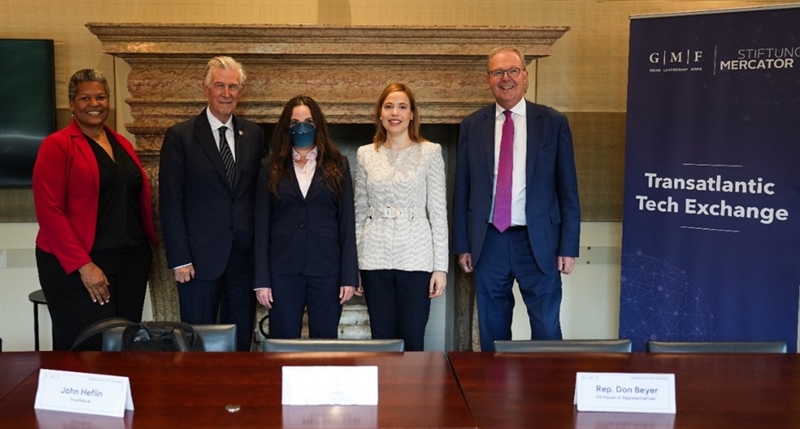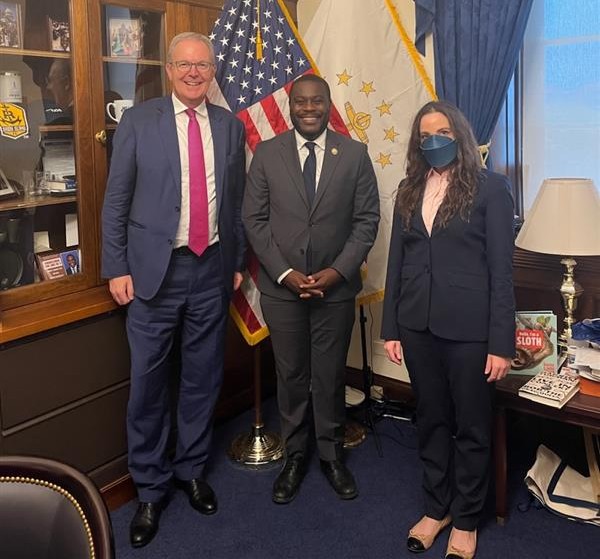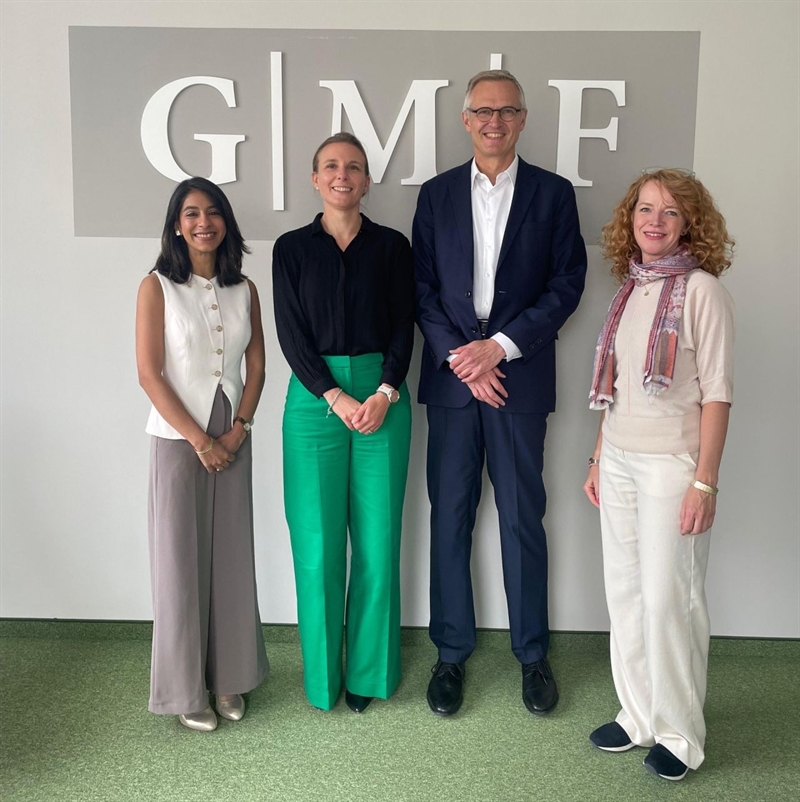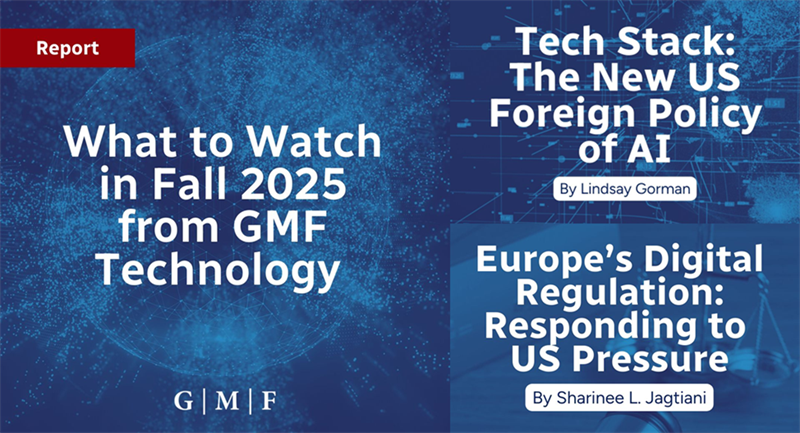TransatlanTech Insider—September 2025 Edition
Welcome to the September edition of the TransatlanTech Insider.
Technology and policy developments have reached a fever pitch on both sides of the Atlantic this fall, with industrial agendas taking shape that may reorient the alliance. US President Donald Trump’s administration has delayed enforcement of the TikTok law for a fourth time, announcing an imminent deal for US investors to buy the app, potentially without its algorithm—a move that would continue to allow Beijing to put its thumb on the scale over the content US users see. In an effort to rescue Intel, the US government has acquired a roughly 10% stake, and NVIDIA will make a $5 billion investment as well in the rival chipmaker. Whereas the United States loosened export controls on high-end AI chip sales to China in an attempt to increase Beijing’s dependence on US tech, the Cyberspace Administration of China has now banned its companies from buying NVIDIA’s RTX Pro 6000D chips tailor-made for the Chinese market.
Across the Atlantic, the landmark “Draghi Report” to increase European competitiveness via technology leadership is one year old. At the EU’s anniversary conference, former Italian Prime Minister Mario Draghi called for a “radical simplification” of the GDPR as a way to increase Europe’s speed and scale on tech development and deployment, and European Commission President Ursula von der Leyen discussed a digital simplification package the Commission is readying by the end of the year. For its part, Albania is seizing the AI moment to pilot a new means of fighting corruption with an “AI minister”—not a minister over AI, but a robot itself. On the China front, EU Tech Commissioner Henna Virkkunen is raising foreign influence concerns over Spain’s recent multimillion-dollar contract with Huawei to store judicial wiretaps.
This month, we share work on AI from our Transatlantic Tech Exchange, a new report on the People’s Republic of China (PRC) influence in Germany’s Tech Stack, and our fall What to Watch in Tech. Subscribe to receive future newsletter editions, follow us on X, and visit our webpage to learn more.
Media Spotlight
Lindsay Gorman Featured on Australian Broadcasting Corporation’s “The World” on US TikTok Deal

Lindsay Gorman was featured on the Australian Broadcasting Corporation in “TikTok Ownership Deal to be Finalized Between US and China” after the Trump administration announced a forthcoming TikTok deal with China and subsequently delayed the TikTok ban enforcement for the fourth time. Gorman discussed the national security concerns and data privacy issues surrounding a potential deal, emphasizing that the United States cannot afford to leave gaps for PRC influence.
Featured this Month
GMF Kicks Off Second Transatlantic Tech Exchange with “Temperature Check” on Transatlantic AI Innovation and Policy and New Piece on the AI Value Chain


Kicking off GMF’s second Transatlantic Technology Exchange (TTX), GMF Technology convened government officials, industry leaders, and technology policy shapers in Washington, DC, on September 16 for a high-level roundtable on AI and the transatlantic relationship. Discussants explored areas of US-EU alignment and divergence on AI innovation and policy, with a particular emphasis on key infrastructure such as data centers; testing for accuracy, safety, and reliability; and competitive applications of AI in the public interest.
Member of the European Parliament Axel Voss, Congressman Don Beyer (D-VA), and Virginia Delegate Michelle Maldonado provided opening remarks for the conversation, which coincided with MEP Voss’ engagement with US AI policy leaders in Congress as part of the TTX’s exchange among transatlantic legislators. GMF President Alexandra de Hoop Scheffer greeted discussants, and GMF Technology’s Lindsay Gorman led the discussion.
The thematic focus of this year’s TTX is the AI Value Chain: the natural resources, industrial and network infrastructure, data, and public and private investments and inputs that together create the machine learning systems known or marketed as AI. Accompanying the roundtable, Program Manager and Fellow Julia Tréhu and Senior Program Coordinator Adrienne Goldstein published a new piece posing 17 hypotheses for transatlantic AI cooperation along the four nodes of the AI value chain: infrastructure, data, models and algorithms, and integration. The piece is the first installment in a series of publications on the future of transatlantic AI policy and innovation that GMF will release over the course of the TTX initiative.
GMF Releases “Tech Stack” Report on China’s Technological Influence in Germany

GMF Technology published a new report by Senior Officer Sharinee Jagtiani that maps China’s technological presence in Germany and offers policymakers key recommendations to de-risk Germany’s national tech ecosystem: Risky Configuration: China’s Footprint in Germany’s Technology Stack. This report is the latest installment in GMF Technology’s Tech Stack report series, which analyzes China’s global technological influence using a five-layer “tech stack” framework.
GMF Technology brought together policy stakeholders in Berlin on September 17 to present the research and explore how China’s presence across critical layers of the technology stack shapes Germany’s security and competitiveness. The discussion featured Hanna Katharina Müller, Head of Division of Political Systems, Hybrid threats, and Disinformation at the Federal Ministry of the Interior; Olaf Schulz, Head of Global Political Risks Analysis at Nokia; and GMF Technology’s Lindsay Gorman, Astrid Ziebarth, and report author Sharinee Jagtiani.
What to Watch this Fall in Tech

GMF experts explored technology, security, trade, and democratic governance as well as relations with India and China as defining axes of transatlantic relations in this fall’s What to Watch report, with contributions from GMF Technology. Lindsay Gorman examined the Trump administration’s new American AI Exports Program and its potential to shape US global engagement on tech. The program aims to develop a “full-stack AI tech package”—with similarities to the “tech stack” framework developed by GMF Technology—for allied adoption, backed by government financing and strategic alignment with industry.
Across the Atlantic, Sharinee Jagtiani analyzed the EU’s decision to resist US calls for changes to its Digital Markets Act and Digital Services Act. With the new EU–US trade agreement avoiding mention of these digital regulations, this fall will be a test of Europe’s resolve to enforce its rules while navigating US demands.
From technology to security to trade, GMF experts see the transatlantic relationship in a decisive phase this fall, with choices poised to reverberate across the global order.
Media Mentions
Lindsay Gorman in The New York Times on US-China TikTok deal
“We’ve seen this movie before where we get really close to a deal and we get an announcement that something’s coming, only to have it fall apart,” said Gorman in “Trump Officials Say They Have a Deal to Avert a TikTok Ban. Will This One Stick?” “There are many open questions that we hope will be answered between now and Friday.”
Sharinee Jagtiani in Tagesspiegel on Germany’s technological dependence on China
“Even though geopolitical attention is currently shifting to Russia and transatlantic tensions, China's growing technological influence in Germany must remain a strategic priority,” Jagtiani said in “Germany cannot let go of China”, which featured GMF Technology’s latest Tech Stack report on China’s technological footprint in Germany.
Lindsay Gorman in DW News on the Trump administration’s delay of the TikTok ban
Gorman discussed the national security implications of potential PRC control of TikTok’s algorithm, highlighting the PRC’s worsening track record on election interference.
Sharinee Jagtiani in Table.Media on PRC leverage points in Germany’s technology ecosystem
“Security has its price” Jagtiani said in Tech Stack: This is how Chinese our technological infrastructure is. “In Europe, including Germany, the focus has long been on cost efficiency. But in the current geopolitical situation, we need to invest more in security.”
Byte-Sized Bulletin
AI and Democracy
- Anthropic agreed to pay $1.5 billion to settle a class-action lawsuit brought by a group of authors who alleged that their works were used without permission to train the chatbot Claude. The proposed deal is the first settlement in a wave of lawsuits targeting tech giants such as OpenAI, Microsoft, and Meta over their use of copyrighted works to train generative AI.
- Albania unveiled a symbolic AI-generated government minister to oversee public procurement as part of Prime Minister Edi Rama’s anticorruption and innovation agenda.
- A federal judge ordered Google to share some search data with its competitors but declined to grant the Department of Justice’s (DOJ) request for harsher antitrust penalties. Google will not be required to sell its Chrome internet browser, which the DOJ contended was necessary to remedy the company’s monopoly.
- Rep. John Moolenaar, the chair of the US House Select Committee on the Chinese Communist Party, has alleged that PRC hackers impersonated him in emails to other officials as part of an effort to expose information on US-China trade issues.
- Anthropic will stop selling AI services to groups with a majority Chinese ownership, a first for a US AI company. The San Francisco-based firm said the decision aims to limit the PRC from using its technology for military and intelligence purposes.
- The US Department of Commerce will revoke Taiwan Semiconductor Manufacturing Company’s authorization to send key chipmaking equipment and technology to its China plant at the end of the year. Future shipments will require individual export licenses.
- German software company SAP will invest more than €20 billion over the next decade to expand its Sovereign Cloud offerings in Europe, including a new infrastructure-as-a-service platform. The investment aims to ensure data residency to maintain compliance with EU data protection regulations.
- The US government acquired a roughly 10% stake in the Silicon Valley chipmaking giant Intel, marking one of the largest government interventions in a US company since the 2008 financial crisis.
- ASML, the Dutch chip lithography manufacturer, announced a €1.3 billion investment in French AI company Mistral, a start-up seen as one of Europe’s most promising artificial intelligence firms.
The Download
- Lindsay Gorman briefed the Japan Bank for International Cooperation on the US AI Action Plan and accompanying Executive Orders.
- Sharinee Jagtiani spoke at a workshop organized by the Friedrich Erbut Stiftung in Goa, India, on Germany’s approach to AI regulation through a gender lens.
- GMF opened registration for its fifth annual European Cyber Agora, which will be held in Brussels on October 22–23, 2025. GMF is partnering with Microsoft and EU Cyber Direct to host the Agora, which will bring together stakeholders from government, civil society, and industry to explore workstreams on AI and societal resilience, cyber accountability and resilience, and digital transformation for security and defense. Register here today.
GMF Technology is dedicated to ensuring that democracies together win the strategic technology competition with autocrats.
Alexandra Pugh and Adrienne Goldstein coordinated this month’s TransatlanTech Insider.

